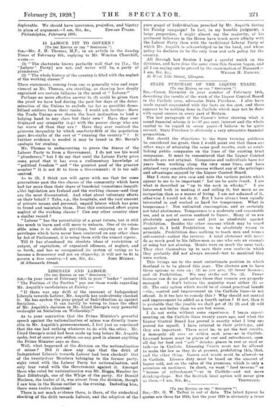STATE PURCHASE OF THE LIQUOR TRADE.
(To THE EDITOR OF THE " SPECTATOR.") SIR,—Canon Rawnsley in your number of February 14th, describing the results of the work of the Liquor Control Board in the Carlisle area, advocates State Purchase. I also have made myself- acquainted with the facts on the spot, and there appears to be nothing done in Carlisle which may not be done with equal success in every part of Britain.
The last paragraph of the Canon's letter showing what a sound financial scheme it is-17 per cent. interest and the whole capital to be repaid in seven years—I believe to be quite correct. State Purchase is obviously a very attractive financial proposition.
But should the objections to the State turning publican be considered too great, then I would point out that there are other ways of attaining the same good results, such as estab- lishing public companies on the lines of the existing trust companies. It must be remembered that the Liquor Control methods are not original. Companies and individuals have for years been working along the very same lines, and have attained very considerable success without any of the privileges and advantages enjoyed by the Liquor Control Board.
May I state my own case and note the various points which appear to me to be important ? Let me be quite frank. I am what is described as " up to the neck in whisky." I am interested both in making it and selling it, but more as an occupation than as a means of living. I am not ashamed of it, otherwise I would not do it. But I have always been equally interested in and worked as hard for temperance. What is temperance ? Not unlimited consumption, and as certainly not total abstinence. Temperance is a moderate and reasonable use, and is not of course confined to liquor. Many of us are absolutely against excess and -just as absolutely against Prohibition. Besides the other reasons which may be urged against it, I hold Prohibition to be absolutely wrong in principle. Prohibition does nothing to teach men and women self-control—rather the reverse. A total abstainer will never do as much good to his fellow-men as one who sets an example of using but not abusing. Monks were on much the same tack. They shut themselves up to save their own souls—in which they probably did not always succeed—but to mankind they were useless.
This brings me to the most unfortunate position in which
Scotland is to be placed this year. The electors are to have three options to vote on : (1) as you are; (2) fewer licences; and (3) Prohibition. We may strike out No. (2). Fewer licences can do no good unless those that remain are properly managed. I don't believe the majority want either (1) or (3). The only option which would be of sound practical benefit —viz., control and improvement on the Carlisle lines—is not offered. Is it too late to remedy this ? Why should not control and improvement be added as a fourth option ? If not, then it is probable that the jumble we shall get of (1) (2) and (3) will leave us not better than we are but worse.
I do not write without some experience. I began experi- menting on the Carlisle lines twenty years ago, and what the Liquor Control Board has proved is exactly what I long ago proved for myself. I have referred to their privileges, and they are important. There must be, to get the best results, a monopoly all over or within each area—as in Carlisle. Licensed houses must be places of rest and refreshment, open all day for food and " soft " drinks; places to rest or read or talk—as in Carlisle. Licensing Courts must not be allowed to make the law as they do at present, prohibiting this, that, and the other thing. Games and music must be allowed—as in Carlisle. Licence duty must be based on the amount of liquor sold, not on the value of the premises, which is only a premium on nastiness. In short, we want " food taverns" or " houses of refreshment "—as in Carlisle—and not mere drinking-shops. But the Scottish local option will never give


































 Previous page
Previous page